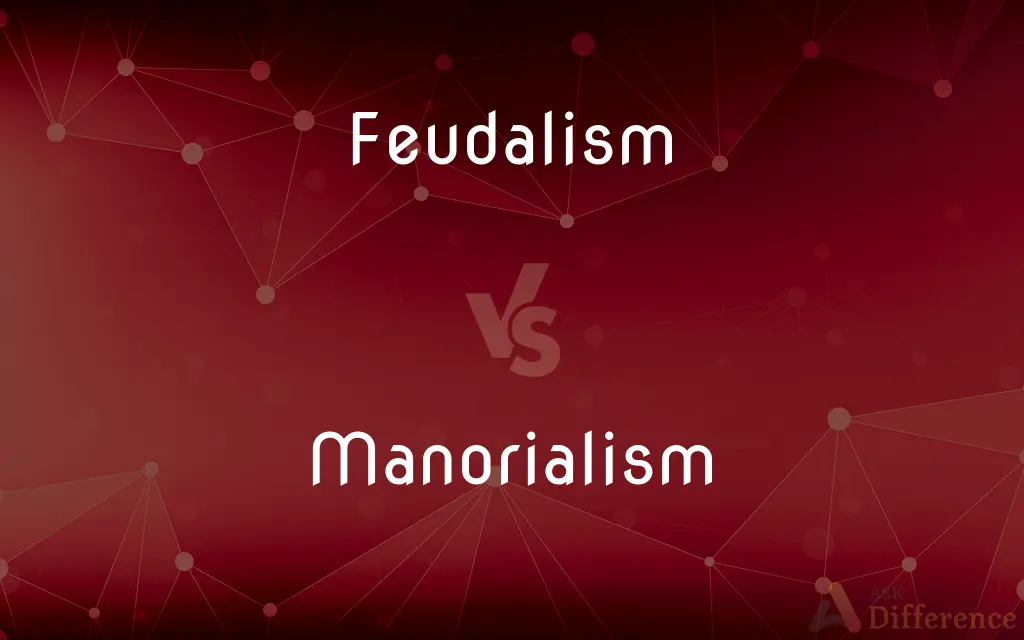Feudalism vs. Manorialism — What's the Difference?
By Tayyaba Rehman & Maham Liaqat — Updated on April 5, 2024
Feudalism involves the political and military relationship between lords and vassals, whereas manorialism focuses on the economic and social system within a manor.

Difference Between Feudalism and Manorialism
Table of Contents
ADVERTISEMENT
Key Differences
Feudalism is a broad socio-political system that structured medieval society around relationships derived from the holding of land in exchange for service or labour. Manorialism, on the other hand, is the economic counterpart to feudalism, centered around the manor, the lord's estate. It involves the organization of the estate's economy, including the relationship between the lord and his serfs or peasants who worked the land.
Feudalism encompasses a wider scope, including political, military, and legal aspects of medieval society, whereas manorialism is specifically concerned with the local economy and the management of the estate. In feudalism, the focus is on the hierarchical relationships between different ranks of society, from kings to knights to serfs, based on land and service. Manorialism, however, concentrates on the day-to-day life and labor on a manor, detailing the roles of the lord and his tenants, especially the serfs, in sustaining the estate.
Under feudalism, a vassal's primary obligation to his lord was military service, which was a key component of the feudal army's strength. This military service was in exchange for the fief, a grant of land, which provided the vassal with income and status. In contrast, the essence of manorialism lies in the agricultural and economic activities on the manor, with serfs and peasants providing labor in exchange for protection and a place to live.
While feudalism created a structured society that defined social relations and hierarchies, manorialism provided the economic foundation that sustained this structure. Feudal relationships were cemented by oaths of loyalty and military service, whereas manorial relationships were grounded in the practicalities of agricultural production and the stewardship of land and resources.
Comparison Chart
Definition
A political and military system of governance based on land ownership and service.
An economic and social system focused on the operation of manors or estates.
ADVERTISEMENT
Key Elements
Lords, vassals, fiefs, homage, and military service.
Lord of the manor, serfs/peasants, agricultural labor, and land management.
Main Focus
Hierarchical relationships and land-based power.
Economic production and management of agricultural estates.
Obligations
Military service and loyalty in exchange for land.
Agricultural labor in exchange for protection and the right to live on the land.
Scope
Broad, encompassing political and legal structures.
Narrow, focusing on the local economy and estate management.
Compare with Definitions
Feudalism
Land granted by a lord to his vassal in exchange for services.
Knights were often granted fiefs as compensation for their service in the lord's army.
Manorialism
Judicial systems within the manor for resolving disputes.
Manorial courts handled disputes among serfs, often presided over by the lord.
Feudalism
A socio-political system where land ownership dictates social hierarchy and obligations.
A lord granted a fief to his vassal in exchange for military service under feudalism.
Manorialism
The owner of the manor with rights over the serfs and land.
The lord of the manor had the authority to enforce laws and collect taxes within his estate.
Feudalism
Ceremonial pledges of allegiance and loyalty made by a vassal to his lord.
During the homage ceremony, the vassal swore fealty to his lord, pledging military support.
Manorialism
Work performed by serfs or peasants as part of their obligation.
Agricultural labor in manorialism included plowing, sowing, and harvesting.
Feudalism
The condition of being a vassal in the feudal system.
Vassalage required knights to serve their lord in warfare as part of their feudal obligation.
Manorialism
The status of peasants under manorialism, tied to the land.
Serfs under manorialism owed labor and allegiance to their lord, often for their whole lives.
Feudalism
A structure of political and military relationships organized by rank.
The king stood at the top of the feudal hierarchy, with various levels of nobility beneath him.
Manorialism
The economic and social structure of managing a lord’s estate.
Manorialism was characterized by serfs working the land for the lord’s profit.
Feudalism
Feudalism, also known as the feudal system, was the combination of the legal, economic, military, and cultural customs that flourished in Medieval Europe between the 9th and 15th centuries. Broadly defined, it was a way of structuring society around relationships that were derived from the holding of land in exchange for service or labor.
Manorialism
Manorialism, also known as the manor system or manorial system, was the method of land ownership (or "tenure") in parts of Europe, notably England, during the Middle Ages. Its defining features included a large, sometimes fortified manor house in which the lord of the manor and his dependents lived and administered a rural estate, and a population of labourers who worked the surrounding land to support themselves and the lord.
Feudalism
A political and economic system of Europe from the 9th to about the 15th century, based on the holding of all land in fief or fee and the resulting relation of lord to vassal and characterized by homage, legal and military service of tenants, and forfeiture.
Manorialism
A political, economic and social system in medieval and early modern Europe; originally a form of serfdom but later a looser system in which land was administered via the local manor.
Feudalism
A political, economic, or social order resembling this medieval system.
Feudalism
A social system based on personal ownership of resources and personal fealty between a suzerain (lord) and a vassal (subject). Defining characteristics are direct ownership of resources, personal loyalty, and a hierarchical social structure reinforced by religion.
Feudalism
The feudal system; a system by which the holding of estates in land is made dependent upon an obligation to render military service to the king or feudal superior; feudal principles and usages.
Feudalism
The social system that developed in Europe in the 8th C; vassals were protected by lords who they had to serve in war
Common Curiosities
What is feudalism?
Feudalism is a medieval system of political organization based on the exchange of land for military service and loyalty.
Who were serfs in the manorial system?
Serfs were peasants who worked on a lord's land and provided agricultural labor in exchange for protection and housing.
How does manorialism differ from feudalism?
Manorialism focuses on the economic and social aspects of medieval life on a manor, while feudalism involves broader political and military relationships.
What were the main obligations of a vassal in feudalism?
A vassal's main obligations included military service and loyalty to their lord.
What is a fief in feudalism?
A fief is a parcel of land granted to a vassal in exchange for military services.
Can a society have feudalism without manorialism?
While theoretically possible, in practice, feudalism and manorialism often coexisted as complementary systems.
What rights did serfs have under manorialism?
Serfs had limited rights, including the right to work specific plots of land and protection from the lord.
What was the role of a lord in feudalism?
In feudalism, a lord was a landowner who granted land to vassals in exchange for military service and loyalty.
How did manorialism support the feudal system?
Manorialism provided the economic foundation necessary to sustain the feudal hierarchy and military obligations.
What led to the decline of feudalism and manorialism?
The decline was due to a variety of factors including economic changes, the rise of centralized monarchies, and social upheavals.
Share Your Discovery

Previous Comparison
Principle vs. Policy
Next Comparison
Habit vs. RoutineAuthor Spotlight
Written by
Tayyaba RehmanTayyaba Rehman is a distinguished writer, currently serving as a primary contributor to askdifference.com. As a researcher in semantics and etymology, Tayyaba's passion for the complexity of languages and their distinctions has found a perfect home on the platform. Tayyaba delves into the intricacies of language, distinguishing between commonly confused words and phrases, thereby providing clarity for readers worldwide.
Co-written by
Maham Liaqat












































